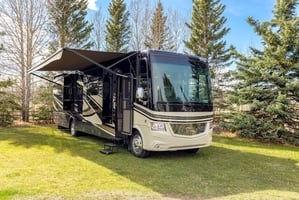When you tow a trailer, a reliable hitch box connection keeps your rig steady and safe on the road. A strong and well-designed hitch box reduces trailer sway and improves towing stability, giving you more control and peace of mind. This connection forms the foundation of your towing setup, so it must handle weight distribution and road forces without adding stress or vibrations.
The ProPride 3P® hitch uses advanced technology that goes beyond typical friction-based systems. Its patented Pivot Point Projection™ creates a virtual pivot point that stops sway where it starts, resulting in smoother and safer towing. Features like a one-piece yoke and adjustable hitch bar make installation easier and prepare your setup for different vehicles or trailers.
Whether you’re pulling an Airstream or a heavy travel trailer, a high-quality hitch box connection helps prevent dangerous sway and keeps your trip comfortable. A reliable system designed for towing safety changes your experience on the road. Learn more about how your hitch box can improve your next adventure. For details, visit the ProPride FAQs.
Key Features of a Reliable Hitch Box Connection
A strong hitch box connection depends on sturdy materials, clear load limits, and built-in safety features. These factors work together to keep your trailer secure and your towing experience smooth and safe.
Materials and Construction Quality
Your hitch box needs tough, durable materials that resist wear and stress. Choose high-strength steel or similar metals that handle heavy loads without bending or breaking.
Welds and joints should be clean and solid, as weak welds often fail. Many premium hitches use a one-piece yoke design to reduce moving parts and improve strength.
Surface treatments like powder coating protect against rust and corrosion, helping your hitch box last longer in harsh weather.
A well-built hitch box prevents the bar from sticking and allows easier connection and disconnection. ProPride uses quality welding and materials for a precise fit and reliable performance.
Load Capacity and Weight Ratings
Your hitch box must clearly state its maximum weight capacity, including tongue weight (downward force from the trailer) and gross trailer weight (total trailer mass).
Choosing a hitch with low weight ratings can lead to sway or even failure under load. Pick a hitch box rated for your heaviest towing needs.
Check for compliance with industry standards to ensure claims are tested and verified. Adjustable hitch bars help match different towing setups and future upgrades.
Always compare the hitch’s ratings with your trailer and tow vehicle specs. Proper matching reduces risk and improves stability on the road.
Safety Mechanisms
A reliable hitch box includes features that reduce sway and keep your trailer stable. Some designs use patented systems to create a virtual pivot point that controls trailer movement like a fifth wheel.
Spring bars, control links, or wedges in the hitch head absorb and counteract sway forces. This reduces shaking and bouncing found in traditional friction-based systems.
Safety features often make installation easier and reduce wear on the towing system. Adjustable offset bars allow fine-tuning without drilling or major modifications.
ProPride’s 3P hitch uses anti-sway technology for safer, smoother towing. Built-in safety means less trailer sway and more confidence during trips.
Installation and Setup Best Practices
Proper hitch box connection requires secure attachment and precise alignment. The connection must handle heavy weight and prevent trailer sway. A clear process and careful adjustments keep everything stable.
Step-by-Step Installation Guide
Gather all needed tools and parts. The ProPride 3P® hitch doesn’t require drilling holes, making setup easier. Attach the frame bracket firmly to your tow vehicle using the provided bolts and tighten them to the recommended torque.
Slide the hitch box into the bracket. Ensure the connection is snug but allows the hitch to pivot as designed. Check that the safety chains and wiring are connected before attaching the trailer.
Use the adjustable offset hitch bar to fit your trailer’s height without forcing the connection. Tighten all control links and spring bars according to instructions. This setup provides smooth sway control every time you tow.
Proper Alignment Techniques
Aligning your hitch box prevents sway and improves towing stability. The hitch head should sit level with your trailer’s tongue. Use a spirit level to check this before tightening.
The virtual pivot point from the ProPride design relies on proper alignment of the one-piece yoke inside the hitch box. Make sure it isn’t offset or twisted.
Adjust the spring bars evenly to balance weight distribution. Uneven tension can cause pulling or sway. Walk around your setup and test the pivot motion manually. The hitch should move smoothly without slipping or binding. Proper alignment ensures the safest ride for you and your trailer.
For more detailed installation tips, see ProPride’s official installation guide.
Performance and Durability Considerations
When you invest in a hitch box connection, consider how it will perform in different weather and road conditions. Proper care keeps it working safely and smoothly over time.
Longevity in Different Environments
Your hitch box connection faces challenges like rain, snow, dirt, and road salt. These can cause rust and wear if the materials and coatings aren’t strong. Look for hitches made with high-grade steel and finished with corrosion-resistant coatings.
Salt and moisture are especially harsh. If you tow near the coast or in winter, the hitch box’s finish should resist salt. Heavy use on rough roads can strain bolts and welds, so quality craftsmanship is important.
The ProPride 3P® Hitch uses premium materials and careful engineering to handle tough conditions. Its one-piece yoke design minimizes weak points that could break or loosen. This design helps it last longer than friction-based hitches or those with many parts.
Maintenance Tips for Lasting Reliability
To keep your hitch box connection working well, regular maintenance is essential. Inspect it before every trip for loose bolts or rust. Tighten any loose parts promptly.
Clean off dirt, salt, and road grime with mild detergent and water, then dry thoroughly. Avoid harsh chemicals that could damage protective coatings.
Lubricate moving parts like the hitch head and pivot points with the recommended grease. This reduces friction and wear.
If you notice cracks, excessive rust, or unexpected play in the hitch box, stop using it and have it checked by a professional. Proper upkeep extends the life of your connection and maintains the trailer sway control you need with a quality hitch like ProPride’s.
Applications and Industry Uses
Reliable hitch box connections ensure safety and stability across many towing situations. Whether you’re hauling heavy loads for business or enjoying a weekend getaway, the right hitch helps prevent trailer sway and ensures a smooth drive.
Commercial Transportation
In commercial transportation, a dependable hitch connection means safer hauling of goods and equipment. Heavy trailers require excellent weight distribution to avoid sway from wind or road conditions.
Your hitch must handle constant use and different load types without losing stability. The ProPride 3P® hitch uses advanced Pivot Point Projection™ technology to eliminate trailer sway, reducing accident and damage risks.
Easy installation and adjustable offset hitch bars let you switch between vehicles or trailers without extra costs or hassle. This adaptability is important if your fleet includes different trucks or trailers. Safety gains lead to fewer delays and lower maintenance expenses, making your commercial towing more efficient.
Recreational Towing
For personal and recreational towing, a solid hitch connection improves your driving experience, especially with RVs or campers. Trailer sway can cause anxiety and unsafe conditions on highways or winding roads.
A hitch that offers fifth wheel-like control without complex setups makes towing easier. The ProPride 3P® provides this by integrating a one-piece yoke and frame bracket, giving you excellent sway control and simple use.
Adjustable and easy to install, this hitch suits families who change vehicles or trailers, such as those towing Airstreams or other campers. It removes the guesswork from weight distribution and sway control, so you can focus on the trip.
Frequently Asked Questions
Choosing the right hitch cargo carrier means knowing which options work best for your needs. Consider top-rated models, reliable brands, and how carriers affect fuel use. Legal rules and safety tips also help keep your cargo and towing setup secure. For heavy loads, specific carriers stand out.
What are the top-rated hitch cargo carriers available?
The best carriers offer strong build quality, easy installation, and good weight capacity. Choose carriers made from durable steel or aluminum that resist rust. Some models fold for storage or have ramps for bike loading.
Which brands are known for the best hitch cargo carriers?
Brands with strong reputations often provide better customer support and warranties. Some focus on innovation and safety features to improve your towing experience. ProPride offers the ProPride 3P® hitch, known for advanced trailer sway control and reliable connections.
How does a hitch carrier compare to a roof box in terms of convenience and fuel efficiency?
Hitch carriers are easier to load without climbing on the roof. They also avoid damage to your car’s paint. However, they add weight behind your vehicle, which can affect handling. Roof boxes may cause more wind resistance, lowering fuel efficiency, but hitch carriers can also reduce mileage depending on load size.
Are there any legal considerations to keep in mind when using hitch-mounted cargo carriers?
Make sure your carrier doesn’t block your vehicle’s license plate or taillights. Local laws vary, so check your state’s rules before towing. Also, confirm that your carrier’s weight doesn’t exceed your vehicle’s hitch rating or cargo capacity.
What are the safety precautions one should take with trailer hitch cargo carriers?
Always check the hitch ball and carrier connection for tightness before each trip. Distribute weight evenly and avoid overloading to reduce sway or damage. Use safety chains if available and make sure lights and signals remain visible.
Can you recommend a heavy-duty hitch cargo carrier for substantial loads?
For heavy-duty needs, choose carriers rated for 500 pounds or more. Look for models with reinforced frames and welded joints. The ProPride 3P® hitch helps maintain towing stability with its sway control technology when you carry heavy cargo.


